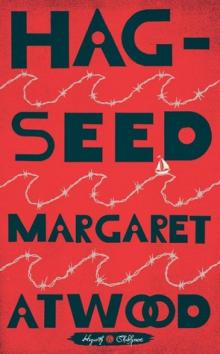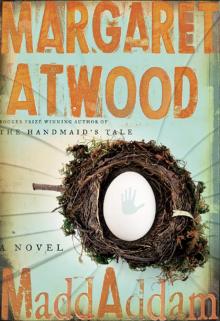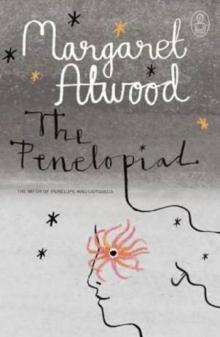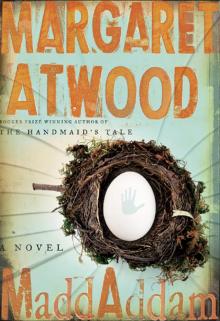- Home
- Margaret Atwood
Moral Disorder
Moral Disorder Read online
INTERNATIONAL ACCLAIM FOR
MORAL DISORDER
“Superb … Atwood displays the same intellectual fearlessness and wit of her other books, but this time tempered with a compassion and richness of portraiture that will surprise even her most avid fans.”
—Boston Globe
“Powerful and distinctive.”
—Times Literary Supplement
“Vintage Atwood: slyly operatic, playfully tenebrous and a touch of sanguinary.…”
—Globe and Mail
“Ingenious and perceptive … deserves to become a quiet classic.”
—Spectator
“The prose has the tautness and diamond-sharp quality that has always characterized Atwood’s best work, but in this collection they are tempered by a meditative poignancy. The result is a fine, complex book rooted in autobiography but moving far beyond it.”
—National Post
“Atwood’s meticulous stories exert a powerful centrifugal force.…”
—Booklist (starred review)
“Atwood is in top form as she sketches female guises and disguises: daughter, sister, lover, wife.”
—Toronto Star
“Surprisingly personal short stories from an artist at her peak. No one else can be so tough and tender at the same time.”
—NOW magazine
“A fractured novel of particularly haunting and engaging beauty.”
—Books in Canada
BOOKS BY MARGARET ATWOOD
FICTION
The Edible Woman (1969)
Surfacing (1972)
Lady Oracle (1976)
Dancing Girls (1977)
Life Before Man (1979)
Bodily Harm (1981)
Murder in the Dark (1983)
Bluebeard’s Egg (1983)
The Handmaid’s Tale (1985)
Cat’s Eye (1988)
Wilderness Tips (1991)
Good Bones (1992)
The Robber Bride (1993)
Alias Grace (1996)
The Blind Assassin (2000)
Good Bones and Simple Murders (2001)
Oryx and Crake (2003)
The Penelopiad (2005)
The Tent (2006)
Moral Disorder (2006)
The Year of the Flood (2009)
FOR CHILDREN
Up in the Tree (1978)
Anna’s Pet (with Joyce Barkhouse) (1980)
For the Birds (1990)
Princess Prunella and the Purple Peanut (1995)
Rude Ramsay and the Roaring Radishes (2003)
Bashful Bob and Doleful Dorinda (2004)
NON-FICTION
Survival: A Thematic Guide to Canadian Literature (1972)
Days of the Rebels 1815–1840 (1977)
Second Words (1982)
Strange Things: The Malevolent North in Canadian Literature (1996)
Negotiating with the Dead: A Writer on Writing (2002)
Moving Targets: Writing with Intent 1982–2004 (2004)
Payback: Debt and the Shadow Side of Wealth (2008)
POETRY
Double Persephone (1961)
The Circle Game (1966)
The Animals in That Country (1968)
The Journals of Susanna Moodie (1970)
Procedures for Underground (1970)
Power Politics (1971)
You Are Happy (1974)
Selected Poems (1976)
Two-Headed Poems (1978)
True Stories (1981)
Interlunar (1984)
Selected Poems II: Poems Selected and New 1976–1986 (1986)
Morning in the Burned House (1995)
The Door (2007)
Copyright © 2006 by O.W. Toad Ltd.
Cloth edition published 2006
Emblem edition published 2009
Emblem is an imprint of McClelland & Stewart Ltd.
Emblem and colophon are registered trademarks of McClelland & Stewart Ltd.
All rights reserved. The use of any part of this publication reproduced, transmitted in any form or by any means, electronic, mechanical, photocopying, recording, or otherwise, or stored in a retrieval system, without the prior written consent of the publisher – or, in case of photocopying or other reprographic copying, a licence from the Canadian Copyright Licensing Agency – is an infringement of the copyright law.
Library and Archives Canada Cataloguing in Publication
Atwood, Margaret, 1939-
Moral disorder / Margaret Atwood.
eISBN: 978-1-55199-552-6
I. Title.
PS8501.T86M59 2009 C813′.54 C2008-904234-4
We acknowledge the financial support of the Government of Canada through the Book Publishing Industry Development Program and that of the Government of Ontario through the Ontario Media Development Corporation’s Ontario Book Initiative. We further acknowledge the support of the Canada Council for the Arts and the Ontario Arts Council for our publishing program.
This is a work of fiction. Names, characters, places, and incidents either are the products of the author’s imagination or are used fictitiously.
Frontispiece photograph: Graeme Gibson
McClelland & Stewart Ltd.
75 Sherbourne Street
Toronto, Ontario
M5A 2P9
www.mcclelland.com
v3.1
For my family
Contents
Cover
Other Books by This Author
Title Page
Copyright
Dedication
The Bad News
The Art of Cooking and Serving
The Headless Horseman
My Last Duchess
The Other Place
Monopoly
Moral Disorder
White Horse
The Entities
The Labrador Fiasco
The Boys at the Lab
Acknowledgements
About the Author
The Bad News
It’s morning. For now, night is over. It’s time for the bad news. I think of the bad news as a huge bird, with the wings of a crow and the face of my Grade Four schoolteacher, sparse bun, rancid teeth, wrinkly frown, pursed mouth and all, sailing around the world under cover of darkness, pleased to be the bearer of ill tidings, carrying a basket of rotten eggs, and knowing – as the sun comes up – exactly where to drop them. On me, for one.
At our place, the bad news arrives in the form of the bad-news paper. Tig brings it up the stairs. Tig’s real name is Gilbert. It’s impossible to explain nicknames to speakers of foreign languages, not that I have to do this much.
“They just killed the leader of the interim governing council,” Tig announces. It’s not that he’s impervious to bad news: on the contrary. He’s angular, he has less body fat than I do and therefore less capacity to absorb, to cushion, to turn the calories of bad news – and it does have calories, it raises your blood pressure – into the substance of his own body. I can do that, he can’t. He wants to pass the bad news on as soon as possible – get it off his hands, like a hot potato. Bad news burns him.
I’m still in bed. I’m not really awake. I was doing a little wallowing. I was enjoying this morning until now. “Not before breakfast,” I say. I do not add, “You know I can’t handle it this early in the day.” I’ve added that before; it’s had only an intermittent effect. After this long together, both of our heads are filled with such minor admonitions, helpful hints about the other person – likes and dislikes, preferences and taboos. Don’t come up behind me like that when I’m reading. Don’t use my kitchen knives. Don’t just strew things. Each believes the other should respect this frequently reiterated set of how- to instructions, but they cancel each other out: if Tig
must respect my need to wallow mindlessly, free of bad news, before the first cup of coffee, shouldn’t I respect his need to spew out catastrophe so he himself will be rid of it?
“Oh. Sorry,” he says. He shoots me a reproachful look. Why must I disappoint him like this? Don’t I know that if he can’t tell the bad news, to me, right now, some bilious green bad-news gland or bladder inside him will burst and he’ll get peritonitis of the soul? Then I’ll be sorry.
He’s right, I would be sorry. I’d have no one left whose mind I can read.
“I’m getting up now,” I say, hoping I sound comforting. “I’ll be right down.”
“Now” and “right down” don’t have the same meaning they used to have. Everything takes longer than it did back then. But I can still get through the routine, out of the nightdress, into the day dress, the doing-up of the shoes, the lubrication of the face, the selection of the vitamin pills. The leader, I think. The interim governing council. Killed by them. A year from now I won’t remember which leader, which interim governing council, which them. But such items multiply. Everything is interim, no one can govern any more, and there are lots of them, of thems. They always want to kill the leaders. With the best of intentions, or so they claim. The leaders have the best of intentions as well. The leaders stand in the spotlight, the killers aim from the dark; it’s easy to score.
As for the other leaders, the leaders of the leading countries, as they’re called, those aren’t really leading any more, they’re flailing around; you can see it in their eyes, white-rimmed like the eyes of panic-stricken cattle. You can’t lead if no one will follow. People throw up their hands, then sit on them. They just want to get on with their lives. The leaders keep saying, “We need strong leadership,” then they sneak off to peek at their poll ratings. It’s the bad news, there’s too much of it: they can’t take it.
But there’s been bad news before, and we got through it. That’s what people say, about things that happened before they were born, or while they were still thumb-sucking. I love this formulation: We got through it. It means dick shit when it’s about any event you personally weren’t there for, as if you’d joined some We club, pinned on some tacky plastic We badge, to qualify. Still, We got through it – that’s bracing. It conjures up a march or a procession, horses prancing, costumes tattered and muddied because of the siege or battle or enemy occupation or butchering of dragons or forty-year trek through the wilderness. There’d be a bearded leader hoisting his standard and pointing forward. The leader would have got the bad news early. He’d got it, he’d understood it, he’d known what to do. Attack from the flank! Go for the throat! Get the hell out of Egypt! That sort of thing.
“Where are you?” Tig calls up the stairs. “Coffee’s ready.”
“I’m here,” I call back down. We use this a lot, this walkie-talkie of air. Communication hasn’t failed us, not yet. Not yet is aspirated, like the h in honour. It’s the silent not yet. We don’t say it out loud.
These are the tenses that define us now: past tense, back then; future tense, not yet. We live in the small window between them, the space we’ve only recently come to think of as still, and really it’s no smaller than anyone else’s window. True, there are little things going wrong with us – a knee here, an eye there – but so far just little things. We can still enjoy ourselves, as long as we focus on doing one item at a time. I can remember when I used to tease our daughter, back then, when she was an adolescent. I’d do it by pretending to be old. I’d bump into walls, drop cutlery, fake memory loss. Then we’d both laugh. It’s no longer such a joke.
Our now-dead cat, Drumlin, developed cat senility when she was seventeen. Drumlin – why did we call her that? The other cat, the one that died first, was Moraine. Once we thought it was amusing to name our cats after glacial-dump geological features, though the point of it escapes me now. Tig said that Drumlin ought to have been named Landfill Site, but he was the one whose job it was to empty her litter box.
It’s not likely we will have another cat. I used to think – I thought this quite calmly – that after Tig was gone (for men die first, don’t they?) I might get a cat again, for company. I no longer consider this an option. I’ll surely be half-blind by then, and a cat might run between my legs, and I’d trip over it and break my neck.
Poor Drumlin used to prowl the house at night, yowling in an unearthly fashion. Nothing gave her solace: she was looking for something she’d lost, though she didn’t know what it was. (Her mind, in point of fact, if cats can be said to have minds.) In the mornings we’d find small bites taken out of tomatoes, of pears: she’d forgotten she was a carnivore, she’d forgotten what it was she was supposed to eat. This has become my picture of my future self: wandering the house in the darkness, in my white nightdress, howling for what I can’t quite remember I’ve lost. It’s unbearable. I wake up in the night and reach out to make sure Tig is still there, still breathing. So far, so good.
The kitchen, when I get to it, smells like toast and coffee: not surprising, because that’s what Tig has been making. The smell wraps around me like a blanket, stays there while I eat the actual toast and drink the actual coffee. There, on the table, is the bad news.
“The refrigerator’s been making a noise,” I say. We don’t pay enough attention to our appliances. Neither of us do. Stuck on to the refrigerator is a photo of our daughter, taken several years ago; it beams down on us like the light from a receding star. She’s busy with her own life, elsewhere.
“Look at the paper,” says Tig.
There are pictures. Is bad news worse with pictures? I think so. Pictures make you look, whether you want to or not. There’s the burnt-out car, one of a series by now, with its skeletal frame of twisted metal. A charred shadow crouches inside. In pictures like these there are always empty shoes. It’s the shoes that get to me. Sad, that innocent daily task – putting your shoes on your feet, in the firm belief that you’ll be going somewhere.
We don’t like bad news, but we need it. We need to know about it in case it’s coming our way. Herd of deer in the meadow, heads down grazing peacefully. Then woof woof – wild dogs in the woods. Heads up, ears forward. Prepare to flee! Or the muskox defence: wolves approaching is the news. Quick – into a circle! Females and young to the centre! Snort and paw the ground! Prepare to horn the enemy!
“They won’t stop,” says Tig.
“It’s a mess,” I say. “I wonder where the security was?” When God was handing out the brains, they used to say back then, some folks we could name were last in line.
“If someone really wants to kill you, they’ll kill you,” Tig says. He’s a fatalist that way. I disagree, and we spend a pleasant quarter of an hour calling up our dead witnesses. He submits Archduke Ferdinand and John Kennedy; I offer Queen Victoria (eight failed attempts) and Joseph Stalin, who managed to avoid assassination by doing it wholesale himself. Once, this might have been an argument. Now it’s a pastime, like gin rummy.
“We’re lucky,” says Tig. I know what he means. He means the two of us, sitting here in the kitchen, still. Neither of us gone. Not yet.
“Yes, we are,” I say. “Watch the toast – it’s burning.”
There. We’ve dealt with the bad news, we’ve faced it head on, and we’re all right. We have no wounds, no blood pours out of us, we aren’t scorched. We have all of our shoes. The sun is shining, the birds are singing, there’s no reason not to feel pretty good. The bad news comes from so far away, most of the time – the explosions, the oil spills, the genocides, the famines, all of that. There will be other news, later. There always is. We’ll worry about it when it comes.
Some years ago – when? – Tig and I were in the south of France, at a place called Glanum. We were on a vacation of sorts. What we really wanted to see was the asylum where Van Gogh painted the irises, and we did see that. Glanum was a side trip. I haven’t thought about it in years, but I find myself there now, back then, in Glanum, before it was destroyed in the third cent
ury, before it was only a few ruins you pay to get into.
There are spacious villas in Glanum; there are public baths, amphitheatres, temples, the kinds of buildings the Romans put up wherever they went so they could feel civilized and at home. Glanum is very pleasant; a lot of upper-level army men retire here. It’s quite multicultural, quite diverse: we’re fond of novelty, of the exotic, though not so much as they are in Rome. We’re a bit provincial here. Still, we have gods from everywhere, in addition to the official gods, of course. For instance, we have a little temple to Cybele, decorated with two ears in token of the body part you might wish to cut off in her honour. The men make jokes about that: you’re lucky to get away with just the ears, they say. Better an earless man than no man at all.
There are older Greek houses mixed in with the Roman ones, and a few Greek ways linger still. Celts come to town; some of them wear tunics and cloaks like ours, and speak decent Latin. Our relations with them are friendly enough, now that they’ve renounced their headhunting ways. Tig has to do a certain amount of entertaining, and I once invited a leading Celt to dinner. It was a social risk, though a minor one: our guest behaved normally enough, and got just as drunk as manners required. His hair was odd – reddish and curly – and he was wearing his ceremonial bronze torque, but he was no more ferocious than some other men I might name, though he did have an eerie politeness.
I’m having my breakfast, in the morning room with the mural of Pomona and the Zephyrs. The painter was not first-rate – Pomona is slightly walleyed and her breasts are enormous, but you can’t always get first-rate here. What would I be eating? Bread, honey, dried figs. Fresh fruit isn’t in season yet. No coffee, worse luck; I don’t think it’s been invented yet. I’m having some fermented mare’s milk, as an aid to digestion. A faithful slave has brought the breakfast in on a silver tray. They’re good at slavery on this estate, they do it well: they’re silent, discreet, efficient. They don’t want to be sold, naturally: being a house-slave is better than working in the quarry.

 Surfacing
Surfacing Hag-Seed
Hag-Seed Oryx and Crake
Oryx and Crake The Heart Goes Last
The Heart Goes Last The Handmaid's Tale
The Handmaid's Tale Lady Oracle
Lady Oracle Good Bones and Simple Murders
Good Bones and Simple Murders The Robber Bride
The Robber Bride Life Before Man
Life Before Man Alias Grace
Alias Grace The Blind Assassin
The Blind Assassin Cat's Eye
Cat's Eye The Testaments
The Testaments The Penelopiad
The Penelopiad MaddAddam
MaddAddam Dancing Girls & Other Stories
Dancing Girls & Other Stories On Writers and Writing
On Writers and Writing Selected Poems II (1976-1986)
Selected Poems II (1976-1986) Wilderness Tips
Wilderness Tips Dearly
Dearly The Tent
The Tent Bluebeard's Egg
Bluebeard's Egg The Edible Woman
The Edible Woman The Penelopiad: The Myth of Penelope and Odysseus
The Penelopiad: The Myth of Penelope and Odysseus Good Bones
Good Bones I Dream of Zenia with the Bright Red Teeth
I Dream of Zenia with the Bright Red Teeth Circle Game
Circle Game Choke Collar: Positron, Episode Two
Choke Collar: Positron, Episode Two Stone Mattress: Nine Tales
Stone Mattress: Nine Tales The MaddAddam Trilogy
The MaddAddam Trilogy Stone Mattress
Stone Mattress Power Politics
Power Politics MaddAddam 03 - MaddAddam
MaddAddam 03 - MaddAddam I’m Starved for You (Kindle Single)
I’m Starved for You (Kindle Single) Murder in the Dark
Murder in the Dark In Other Worlds
In Other Worlds Dancing Girls
Dancing Girls Moral Disorder
Moral Disorder